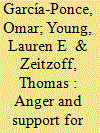|
|
|
Sort Order |
|
|
|
Items / Page
|
|
|
|
|
|
|
| Srl | Item |
| 1 |
ID:
190840


|
|
|
|
|
| Summary/Abstract |
How does exposure to criminal violence shape attitudes towards justice and the rule of law? Citizens care about crime prevention and procedural legality, yet they also value punishing perpetrators for the harm they have done. We argue that anger induced by exposure to criminal violence increases the demand for retribution and harsh punishments, even at the expense of the rule of law. We test this theory using one observational and two experimental studies from an original survey of 1,200 individuals in Western Mexico, a region affected by organized criminal violence and vigilantism. First, we first show that exposure to violence is correlated with increased anger and support for punitive justice, including vigilante actions. Second, across our two experiments, we show that citizens are more supportive of harsh punishments and place less value on their legality in response to morally outrageous crimes. Third, we find that the innocence of the victim, rather than the severity of the crime, is what triggers outrage and punitiveness. This suggests that citizens may support extreme levels of violence as long as they perceive that its targets are criminals. Finally, we show that outrageous forms of violence against civilians can lead individuals to prioritize harsh punishment regardless of its legality. When criminal actors target perceived innocents with common crimes like extortion, there is greater support for harsh, vigilante action. These patterns provide a bottom-up explanation for harsh justice.
|
|
|
|
|
|
|
|
|
|
|
|
|
|
|
|
| 2 |
ID:
151116


|
|
|
|
|
| Summary/Abstract |
Cultivating cooperation with local populations is necessary for peacekeeping operations to effectively prevent and reduce violence. To accomplish their missions in complex foreign theaters of operation, peacekeepers must solicit information about local political actors, social networks, and violence. Under what conditions do local populations cooperate with United Nations peacekeepers? How does exposure to peacekeeping security activities, relief activities, or abuse – three of the primary ways that local communities experience peacekeepers – affect the likelihood that individuals cooperate with peacekeepers by providing information to them? Using an original survey of a random sample of residents of metropolitan Port-au-Prince, Haiti, we show that people who are exposed to security and relief activities by the United Nations peacekeeping operation, MINUSTAH, have more positive opinions of how effective they are, and are more willing to cooperate with peacekeepers by providing them with information. On the other hand, exposure to abuse dramatically undermines civilian opinions of how effective, benevolent, and abusive peacekeepers are but has a smaller effect on cooperation. These findings present an opportunity and challenge for peacekeepers: if public opinion and cooperation are responsive to peacekeeper policy, then peacekeepers must deliver services and prevent abuse in order to solicit the cooperation that is necessary for mission success.
|
|
|
|
|
|
|
|
|
|
|
|
|
|
|
|
| 3 |
ID:
165406


|
|
|
|
|
| Summary/Abstract |
Many authoritarian regimes use frightening acts of repression to suppress dissent. Theory from psychology suggests that emotions should affect how citizens perceive and process information about repression risk and ultimately whether or not they dissent. I test the effects of emotions on dissent in autocracy by running a lab-in-the-field experiment with 671 opposition supporters in Zimbabwe that randomly assigns some participants to an exercise that induces a mild state of fear, whereas others complete a neutral placebo. The fear treatment significantly reduces hypothetical and behavioral measures of dissent by substantively large amounts. It also increases pessimism about parameters that enter into the dissent decision as well as risk aversion. These results show that emotions interact in important ways with strategic considerations. Fear may be a powerful component of how unpopular autocrats exclude large portions of their populations from mobilizing for regime change.
|
|
|
|
|
|
|
|
|
|
|
|
|
|
|
|
|
|
|
|
|